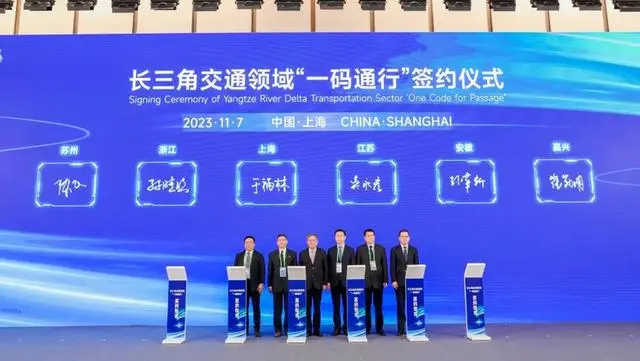This year, Shanghai, along with some other cities like Suzhou and Jiaxing, took the lead in piloting the “One-Code Travel” initiative in the transportation sector.
On November 7th, the third Shanghai Intelligent Transportation Forum announced that the transportation authorities of Shanghai, Jiangsu, Zhejiang, Anhui, and other provinces and cities signed a cooperation memorandum for “One-Code Travel,” officially marking the launch of this initiative in the Yangtze River Delta region. Additionally, the Shanghai Municipal Transportation Commission and the Shanghai Municipal Science and Technology Commission signed a strategic cooperation agreement to comprehensively promote the application of Shanghai’s transportation technology achievements.
According to the “One-Code Travel” plan for the Yangtze River Delta region, in 2023, Shanghai will pilot interconnectivity with cities like Suzhou and Jiaxing. In 2024, interconnectivity will expand to 11 cities, including Hangzhou, Taizhou, Shaoxing, Ningbo in Zhejiang, and Nanjing, Wuxi, Xuzhou, Nantong, Huaian, Lianyungang in Jiangsu, and Hefei in Anhui. The program will continue to expand to more cities in 2025.
In recent years, Shanghai has made significant progress in the development of intelligent transportation, issuing a series of policy documents such as the “Shanghai Municipal Intelligent Transportation System Top-Level Design (2021-2025)” and “Shanghai Transportation Industry Digital Transformation Implementation Plan (2021-2023).” These policies aim to promote the smart, green, and sustainable development of transportation in Shanghai.
Shanghai has already established a wide range of autonomous driving test road scenarios, with a cumulative total of 926 routes covering 1,800 kilometers, ranking among the top in the nation. This year, they plan to further expand the autonomous driving test road scenarios in Pudong New Area, providing a wider range and more diverse testing environments in areas like Jinqiao and Pudong Airport. They are also deepening the layout of intelligent connected vehicle testing scenarios, exploring sustainable, replicable, and scalable commercial paths for autonomous driving, and accelerating the demonstration operation of large-scale intelligent connected vehicles. This includes pilot operations of autonomous buses in specific time periods and routes in the central urban area.
Shanghai has already installed around 770,000 various charging stations, including approximately 180,000 public and specialized charging stations, effectively addressing the issue of charging accessibility. In the next three years, Shanghai plans to add over 30,000 new public charging stations and expedite the development of smart parking facilities. They are creating a demonstration project for smart parking at the Xuhui West Bank Media Port, offering various intelligent travel and parking services.
Shanghai’s Mobility as a Service (MaaS) has realized “One-Code Travel” for public transportation, providing convenient public travel services to the general public. They were the first to introduce the “Apply and Enjoy” feature, offering convenient and free rides for six specific groups, including disabled individuals. They have also launched various ticketing services such as “customized routes,” “universal single-ticket usage,” and “interconnected daily passes,” allowing passengers to use autonomous taxi services in specific areas. The parking reservation feature covers over 100 hospitals across the city, and the “Peak Sharing” feature has been introduced to nearly 500 locations. MaaS has also introduced a digital travel assistant for home television, bridging the “digital divide” for senior citizens.
